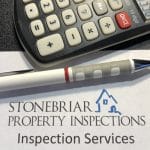By Keith Boggs
Posted December 15, 2020, at 7:00 am CT
“What is included in a home inspection?” This is a question we get all the time. And we’ve written several articles going into a lot of detail (perhaps too much detail!) to help buyers and sellers understand what we, as home inspectors, are required to do when inspecting homes and other properties in the State of Texas.
We don’t, however, have many people ask, “What is not included in a home inspection?” And that’s just as important as knowing what is included! Buyers and sellers should both be asking their home inspector this question. Why?
- It clarifies what is included in a home inspection. Some people we work with have never been through a home inspection. For others, it may have been years or decades since the last time they went through the experience. Asking what isn’t included in the home inspection gives you a clearer overall understanding of what you can expect.
- It ensures everyone is on the same page. There’s a lot that happens during a home inspection, and misunderstandings can occur. Talking about what’s not included in an inspection can prevent them from happening by establishing a shared understanding before the inspection happens.
- It triggers you to think of other questions to ask. If your home inspector tells you that the swimming pool is not included in his inspection, you might think to ask about inspection of the hot tub and other outdoor components. And if inspecting the pool is important to you, you’ll be reminded to ask if it can be inspected at an additional cost.
Keep in mind also, that every home inspection company is different. Some will only evaluate what they’re required to inspect by the Texas Real Estate Commission (TREC), which is the State’s licensing body for home inspectors. Others will go above and beyond those minimum standards. So, asking a potential home inspection company what is not included in a home inspection can be very revealing when you’re making phone calls to find the right one for you.
Here are a few ways home inspectors go above and beyond TREC’s basic requirements: They may test systems and components using a variety of different settings to make sure you have extra confidence in their findings. They may include the inspection of non-required components, like sprinkler systems, driveways, walkways, and patios, without additional fees. Or they may go into much more detail in the inspection report than the State mandates, including photos, videos, and a video summary as part of the final deliverables, which they’re not required to do. Oh, and they’ll also be available after the inspection to address questions and make sure you have a full understanding of the inspection report and the condition of the property.
You want your home inspector to go above and beyond the minimum requirements!
Asking what is not included in a home inspection helps you meet that goal.
So, let’s start with what TREC requires home inspectors to evaluate as part of every inspection. At a very high level, they must:
- Visually inspect accessible components, operating equipment, and appliances in one mode with ordinary controls at typical settings.
- Follow the minimum inspection requirements for appliances and the following systems: structural, electrical, HVAC, and plumbing.
- Deliver a basic inspection report (no photos or videos required) within three days.
You can find a more detailed description of the various components Texas home inspectors are required to inspect at our blog post, What is Included in a Typical Home Inspection? Here’s What Buyers Should Know.
What is Not Included in a Home Inspection?
Now, here is a general list of what they are not required to inspect. Your home inspector doesn’t have to:
- Inspect anything that’s not “accessible” — nothing that’s buried, hidden, blocked, or concealed.
- Fix issues that prevent him from inspecting something, for example, he doesn’t have to connect appliances, light pilot lights, or flip circuit breakers.
- Inspect non-required components, including:
- A number of automated and programmable control systems, including smart home devices.
- Concrete areas, like driveways, sidewalks, and patios, and
- Optional systems, which include sprinkler systems, swimming pools, spas, hot tubs, pool equipment, outbuildings, wells, and septic systems.
- Put himself in danger, for example, he can visually inspect a very high-pitched roof from the ground, but he may not be able to walk on it for an up-close look, depending on weather conditions.
Home inspectors also aren’t required to use specialized equipment, including:
- Thermal imaging cameras (Learn more here)
- Elevation measurement systems (Learn more here)
- Gas or carbon monoxide detection equipment
- Moisture meters, or
- Environmental testing equipment.
And they aren’t required to identify the presence of:
- Pests, termites, or other wood-destroying creatures (Learn more here), or
- Environmental hazards, like asbestos, lead-based paint, mold, or mildew.
Keep in mind, however, that this is not an exhaustive list — and every home inspection company is different. So, if you have concerns about certain aspects of the home, make sure to ask specifically if your home inspector will or will not inspect those elements. If the answer is “no,” you may want to schedule an evaluation by a certified specialist for those areas of concern.
If you want to learn more about what to look for when hiring a home inspector, check out these related articles on our blog:
- Selecting a Home Inspector? Ask These 13 Questions.
- How to Choose a Home Inspector? These are Our Top 5 Tips.
- The Most Important Question to Ask a Home Inspector Before You Hire
Finding a Home Inspector Who Goes Above and Beyond
The best home inspectors will be crystal clear about what is and isn’t included in a home inspection. They want to offer buyers and sellers a good service at a fair price. They won’t nickel and dime you for going above and beyond the State’s minimum requirements. That’s one of the ways they differentiate themselves from your average home inspectors.
Here’s how Stonebriar Property Inspections’ experienced home inspectors provide the best service to our valued clients. We will inspect your sidewalks, driveways, patios, and sprinkler systems as part of our standard home inspection. We do have thermal imaging cameras, and we use them to detect moisture and electrical hazards, even though we’re not required to do so. And, if we see signs of wood destroying insects or other environmental hazards, like mold or mildew, we will make sure that is included in the inspection report. We also deliver our reports — which are among the most detailed, comprehensive reports you will find in the home inspection industry — within 24 hours and often the same day as the inspection.
Understanding what is not included in your home inspection gives you peace of mind that you’ve hired the right inspector at the right cost. This individual (and remember, you’re not just hiring a company, you’re hiring a person!) will be your ally on your home buying or selling journey. He or she will give you the knowledge you need to make the wisest investment. And since this is one of the biggest purchases you will likely make in your lifetime, you want to know as much as possible.
Please reach out to us for more information about how we can provide top-notch home inspection services at reasonable prices with the best customer service in the North Texas area.
About Our Licensed Dallas Home Inspections
Keith Boggs is the owner of Stonebriar Property Inspections. He is your personal home inspector, and his investment in the company will be reflected in the quality of your inspection. Mr. Boggs’ inspection reports are professional, comprehensive, detailed, and clear. They average about 60 pages, include 100 to 200 color images, and include detailed findings, recommendations, tips, and best practices for maintaining your home. Buyers also receive a full video debrief explaining all findings. Stonebriar Property Inspection’s customer reviews speak to Keith’s reputation as an ethical, reliable, and courteous Dallas home inspector. Stonebriar Property Inspections is a proud member of the Better Business Bureau with an A+ rating. SPI is fully licensed by the Texas Real Estate Commission for home inspections and the Texas Department of Agriculture for termite/wood destroying insect inspections.





